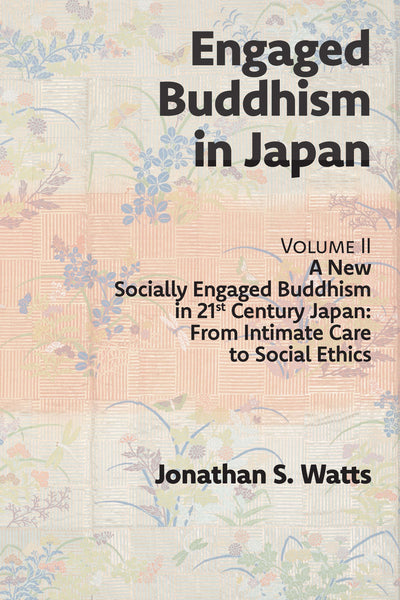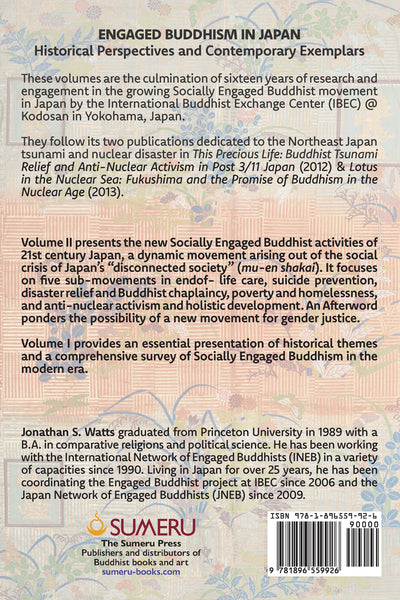ENGAGED BUDDHISM IN JAPAN, volume II
Engaged Buddhism in Japan
Volume II A New Socially Engaged Buddhism in 21st Century Japan: From Intimate Care to Social Ethics
Jonathan S. Watts
ISBN 978-1-896559-92-6 / 362 pages / 6.14" x 9.21" / includes bibliography / Publication October 2023
Volume II presents the new Socially Engaged Buddhist activities of 21st century Japan, a dynamic movement arising out of the social crisis of Japan’s “disconnected society” (mu-en shakai).
Volume I provides an essential presentation of historical themes that make Japanese Buddhism so unique and hard to understand for even other Buddhists in Asia. Volume I also provides a critical and comprehensive survey of Socially Engaged Buddhism in the modern era, which for the postwar period has never been fully documented.
These volumes are the third major publication of the Engaged Buddhism Project of the International Buddhist Exchange Center (IBEC) @ Kodosan in Yokohama, Japan. They follow its two volumes dedicated to the Northeast Japan tsunami and nuclear disaster in This Precious Life: Buddhist Tsunami Relief and Anti-Nuclear Activism in Post 3/11 Japan (2012) & Lotus in the Nuclear Sea: Fukushima and the Promise of Buddhism in the Nuclear Age (2013).
They are the culmination of sixteen years of research and engagement in the growing Socially Engaged Buddhist movement of Japan.
Jonathan S. Watts has been developing the Engaged Buddhist project at IBEC as well as the Japan Network of Engaged Buddhists (JNEB) since 2006. He began working with the International Network of Engaged Buddhists (INEB) in 1990 after graduating from Princeton University in 1989 with a B.A. in comparative religions and political science. In 1996, he helped form the INEB Think Sangha, an activist oriented Engaged Buddhist think tank, to develop Buddhist perspectives on contemporary social issues, and joined the INEB Executive Board in 1999. From 1999 to 2018, he served as a research fellow at the Jodo Shu Research Institute in Tokyo, editing the volume Buddhist Care for the Dying and Bereaved (Wisdom Publications, 2012). He presently teaches contemporary Japanese Buddhism at Keio University and supports the Rinbutsuken Institute’s Buddhist Chaplaincy training program.
CONTENTS
Introduction: The Rise of Japan’s Disconnected Society (mu-en shakai)
1 Recollecting Death: Reforming Funeral Buddhism through Compassionate End-of-Life Care
2 Rewriting Culture: The Suicide Prevention Priests of Japan
3 Entering the Zone of Suffering: Disaster Relief, Grief Care, and Buddhist Chaplaincy
4 Rebuilding Karmic Bonds: A Buddhist Path through Rural Decline, Migrant Laborers, Poverty, and Homelessness
5 Aspiring for Enlightened Development: The Disaster of Nuclear Energy and the Potential for “Buddhist Development” (kai-hotsu)
Afterword: The Next Stage of Socially Engaged Buddhism in Japan?
Appendices
Key Individuals and Organizations
Works Cited
Special Acknowledgments
WHAT PEOPLE ARE SAYING
“This revelatory book sheds a whole new light on Buddhism in Japan, a Buddhism that is socially engaged, brave, and totally surprising. This is a must-read for all of us. The writing is bright and clear; the research deep and thorough; the characters in the book are profoundly memorable.” Roshi Joan Jiko Halifax, founder Upaya Zen Center and Buddhist Chaplaincy Training Program
“A long-awaited correction to old stereotypes that Japanese Buddhists escape the world by staring at walls, or succumb to the world by marrying and drinking. Japanese Buddhism leaves its medieval traditions to deal with a sustainable social future; memorably inspiring vignettes of Buddhists addressing real-life issues. Engaged Buddhism from an engaged Buddhist—Jonathan Watts walks the walk with grass-roots leaders of Buddhist responses to hospice, homelessness and suicide, natural and man-made disasters. Watts knows Japan and its engaged Buddhists like no one else; his latest volume is an engaging resource for anyone interested in Buddhism, or activism, or both.” Dr. Carl B. Becker, professor at the Kyoto University Kokoro (Heart-Mind) Research Center and renowned thanatologist








